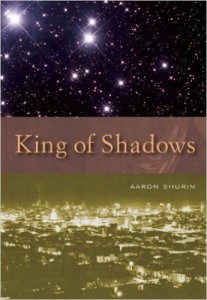 King of Shadows
King of Shadows
by Aaron Shurin
City Lights Books. 171 pages, $16.95
MAINLY KNOWN as one of the royals of the San Franciscan avant-garde poetry scene, Aaron Shurin has produced a collection of 21 short prose pieces, King of Shadows, which offers up some of the joys of reading a poet’s prose. One gets to know the poet, who describes himself as “the bastard son of Robert Duncan and Frank O’Hara,” far better here than his sometimes oblique poetry would allow. Careful readers can enjoy the poet’s linguistic and imaginative acrobatics as they transform his words into a lyrical prose.
The pieces Shurin assembles in King of Shadows range in tone from the ecstatic to the elegiac.
A gay writer especially attuned to how desire informs identity, Shurin also brings sex, eroticism, and the body into his search for precise recollection. For example, he writes about “the narrative suspense of rhyme”: “[W]e could call it the in or out stroke of a fuck; the tease with promise of completion; the organic trace-beats of breath, of course, of pulse and heart.” Shurin’s erotic and vibrant sensibility can be seen more simply and subtly in his descriptions of physical phenomena: “A clean wash of blue gathers toward white in the crotch of the distant hills.”
The collection’s standout is the title piece, a touching, funny, and smart recollection of a high school encounter with Shakespeare in the role of Puck. Struggling with shame and fearing the label of “faggot,” Shurin recalls being told they would have to rehearse in ballet slippers, finding them in their shoebox “as two viciously nesting bats.” But one’s nature cannot be outrun or hidden from. Shurin writes of taking on the form, face, and voice of Puck: “There are poetic forms that precede us, just as coded DNA widens the bulb of a nose or flattens the feet./ To put on the mask of a mythic structure that would prove to be my natural face. …/ To mouth the masque of a mythic structure of language whose amped sonorities and playfulness would prove to be my natural voice.”
Some readers will undoubtedly identify with the writer when he recalls the torment and pleasure of the young man worshiping guiltily at the altar of the “posing strap” model in “physique” magazines: “By day I was popular, scholarly enough, hetero affective (with a girlfriend named Wendy), elaborately, meticulously friendly. After dark, alone, in secret terrible conference, the sailors, surfers, and costumed farm boys, with sweat-oiled bodies and semi-transparent briefs, posed for my singular review. No penis since (there have been hundreds) has encapsulated such perfect promise as those that lay beneath these thin cotton posing straps, which in their veiled seductive power revealed only and exactly as they hid.”
Shurin can be writing about his first introduction to ballet or the discovery that his father had a gambling problem, but he’s always also considering the art of poetry. He connects the Buddhist idea of a consciousness that has gone through multiple lives to the compositional mind “where you lock intensely onto writing while the whole world swirls through.” In a piece about his father, he notes the importance of discovery to a writer, “where the poem’s everyday agenda is to read the world’s hidden text of correspondences,” and how the poet must “empty all the drawers in order to find what you weren’t looking for, the sad radiant clue of absolution.” Of a ballerina that he’s stunned by, he writes of his desire not to be an artist but to embody art: “I didn’t want to be her. I wanted to be her dance.”






